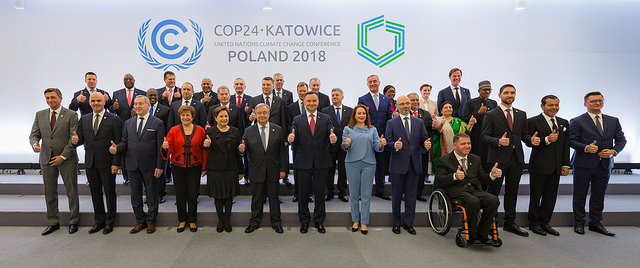For the next two weeks, the city of Katowice in Poland will play host to the 24th Conference of the Parties to the United Nations Framework Convention on Climate Change, or COP24 for short. This gathering of government representatives, civil society organisations and citizens from all over the world offers the first meaningful opportunity, since the conclusion of the Paris Agreement, for world leaders and decision makers to come together and say “we are going to do more to address climate change”.
COP24 arrives less than two months after the publication of the Intergovernmental Panel on Climate Change Special Report on achieving the 1.5oC temperature target set out in the Paris Agreement. That report was unequivocal – it told us that there is just 12 years to reduce global emissions by 45% in order to secure a safe world for our children and grandchildren. The report tells us that global action on climate change is completely insufficient. Countries around the world can, and must, do more now to ensure we radically change course.
The culmination of the Talanoa Dialogue
COP 24 marks the culmination of a year spent taking stock of progress towards the targets set out in the Paris Agreement. In the Paris in 2015, countries agreed that an inclusive dialogue would take place in 2018 in order to take stock of collective national efforts to achieve the long term goal set out in the Paris Agreement so as to inform the further development of these national efforts. As Fiji held the presidency of the Conference of the Parties for the duration of 2018, they called this stocktaking process a “Talanoa Dialogue”.
Talanoa is a traditional word used in Fiji and across the Pacific to reflect a process of inclusive, participatory and transparent dialogue. The purpose of Talanoa is to share stories, build empathy and to make wise decisions for the collective good. The process of Talanoa involves the sharing of ideas, skills and experience through storytelling. During the process, participants build trust and advance knowledge through empathy and understanding.
This process is completely consistent with climate justice and the Fijian’s must be congratulated for introducing such a respectful and inclusive style of engagement to the UN system. I would like to see the Talanoa Dialogue become the norm for engaging member states in discussion on seemingly difficult or intractable issues.
The Talanoa Dialogue will conclude at COP 24 and, having had the chance to reflect on action taken to date and on the stark warnings contained in the IPCC report, countries that wish to lead on climate change must now adopt robust and ambitious commitments as they ratchet up their nationally determined contributions.
Establishing the rules for climate action
Negotiators in Poland will be focused on the development, and finalisation, of the set the rules upon which the Paris Agreement will be implemented. These rules will ultimately inform the development of national policies on climate action and so their impact will be felt in all countries around the world. From a climate justice perspective, these rules must respect human rights, gender equality and enable a just transition for workers around the world.
As the urgency to take climate action increases, so do the risk that climate action will be implemented in such a way as to undermine the rights of people in vulnerable situations. Climate change is already undermining the rights of people around the world. Negotiators gathered in Poland must ensure that future climate action is just, equitable and inclusive – good for people as well as the planet.
An opportunity for unity
This set of negotiations get underway against a backdrop of fraught international relations and growing populism. However, geopolitical tensions must not provide an excuse for inaction at COP24. Climate change confronts us with the reality of our interdependence. No one country or one leader can protect their citizens from the impacts of climate change. It is only through collective action that we will overcome this grave existential crisis that we are facing. The findings of the IPCC’s 1.5oC provides us with a timely reminder that any stalling is unconscionable. Countries committed to collaboration and multilateralism have an opportunity in Katowice in the coming weeks to pull together and take the steps necessary to save the world from a catastrophic climate crisis. It’s an opportunity that must be seized.


